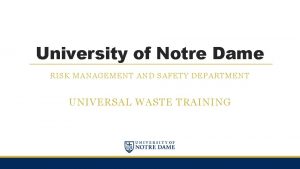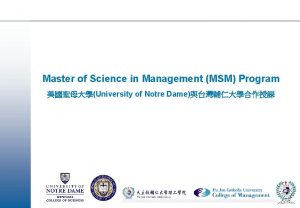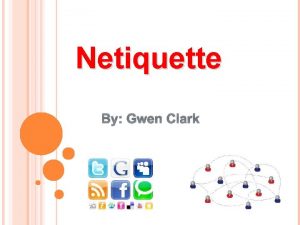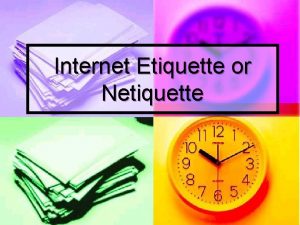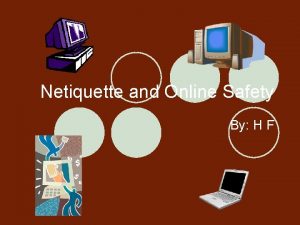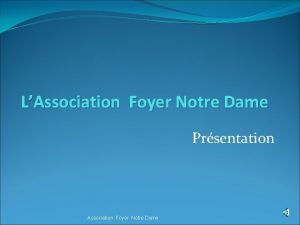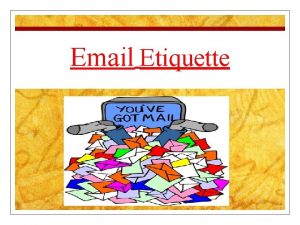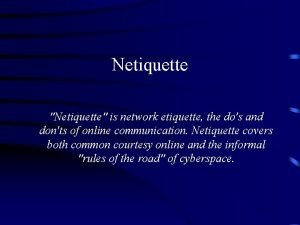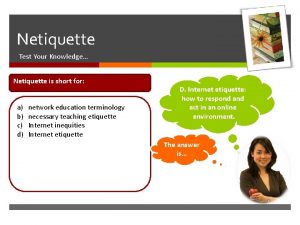Internet Netiquette Safety 12212021 Linda Rush Notre Dame

















- Slides: 17

Internet Netiquette & Safety 12/21/2021 Linda Rush - Notre Dame School


• Never use the Internet without adult supervision. • Never drink or eat at a computer. Food and drinks can damage the keyboard take care of your computer and keep it clean.

• Never use bad language or write hateful things about another person. • Never share your password, keep your password a secret*******.

• Never give out information, such as your name, address, telephone number, school name or a friend's name • Never download files or programs without permission from an adult. They can contain viruses or programs that can harm your computer.

• Do not open or click • Do not put a magnet on banners or near your advertisements and computer's CPU this if one pops open, can damage the click the X to close it. computer.

• Be careful handling • Always use the CDfloppy disks, do not ROM button to open play with the mental and close the CDclip this can damage ROM drive pushing the disk on the door can damage it.

• Always share your Internet knowledge with others. • Never respond to a message that makes you feel confused or uncomfortable, tell your teacher or parent if you come across any information online that makes you feel uncomfortable.

• Be careful downloading files or programs. They can contain viruses that can harm your computer • Never agree to go meet a person you have met online. You should know everyone on your buddy list.

• Never send your • Remember picture to a person Spammers collect you have met online. screen names in chat rooms.

• Do not forward email • Tell your teacher or without the author's parent if you come permission. across any information online that makes you feel uncomfortable.

• Never use a computer to steal or destroy computers, files or programs. • Keep your email messages short and to the point and always include a subject line.

• Do not criticize anyone online. (Netiquette) • Capital letters means that you are shouting. (Netiquette)

• Never open an email from a sender you do not know especially if it has an attachment. This could be a virus. • Email Attachments can contain computer viruses be careful before you open them. You can scan attachments for viruses.

• Delete suspicious email do not open them and then empty your deleted folder. • Look for the security lock on the taskbar before entering private information into the computer.

Credits • http: //bcsberlin. k 12. nj. us/CPUsite/Computers/ind ex. htm • Slim Goodbody. "Math Monsters: Computers. " unitedstreaming. http: //www. unitedstreaming. com/ – Real World Examples: Using the Internet

Other Resources • Scholastic. "Magic School Bus Gets Programmed, The. " unitedstreaming. http: //www. unitedstreaming. com/ • http: //www. brainpop. com/technology/computers/intern et/ • http: //www. brainpop. com/socialstudies/currentevents/o nlinesafety/
 Cn tower golden ratio
Cn tower golden ratio Notre dame suter
Notre dame suter Notre dame cpt
Notre dame cpt Notre dame army rotc
Notre dame army rotc Cathédrale notre-dame-de-l'assomption de naples
Cathédrale notre-dame-de-l'assomption de naples Michael meyer notre dame
Michael meyer notre dame Risk management notre dame
Risk management notre dame Brad weldon notre dame
Brad weldon notre dame Notre dame des sablons
Notre dame des sablons Notre-dame de santa cruz
Notre-dame de santa cruz Notre dame organum
Notre dame organum University of notre dame map
University of notre dame map Notre dame la grande france artistic elements
Notre dame la grande france artistic elements Nous te saluons ô toi notre dame
Nous te saluons ô toi notre dame Notre dame army rotc
Notre dame army rotc Sanctuaire plateau de son ange
Sanctuaire plateau de son ange Master of science in management
Master of science in management Notre dame de la lumière chapelet
Notre dame de la lumière chapelet






